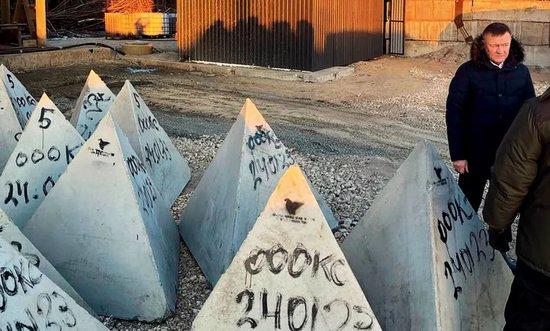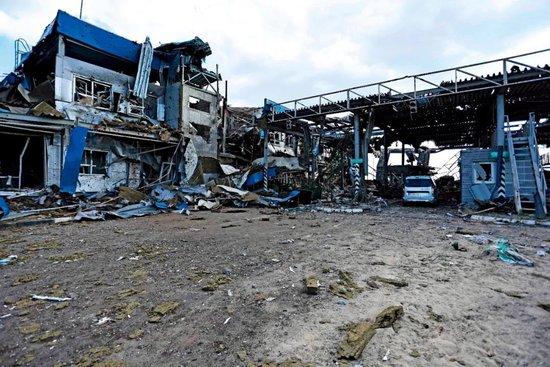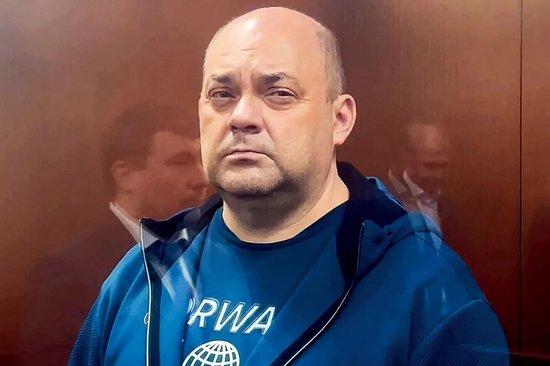


Subsequently, Starovoiyt drove his Tesla electric car to a park near Moscow State. Around 3 PM that day, his body was found and preliminary investigations indicated a suicide.
Three days later, Starovoiyt received a “respectable burial,” attended by more than ten Russian government ministers at the farewell ceremony. However, Russian media outlets such as “Businessman” revealed that Starovoiyt had been involved in the corruption investigation of the Khrushchev border defense works being conducted by the Ministry of Internal Affairs, and he might be “one of the main defendants.”
In April this year, Starovoiyt’s deputy and successor in Khrushchev State, Alexei Smirnov, had already been arrested for related cases. Some media reported that it was Smirnov who revealed his former boss. At the same time, the investigation into corruption within the border defense works in Belgorod State, which had been concluded by the Ministry of Internal Affairs, entered the prosecution phase in July, with arrests including the state deputy governor of the state, Ruslan Zaiunin.
Since the full escalation of the Ukrainian crisis in 2022, both Russia and Ukraine have experienced numerous major wartime corruption cases. Now, the anti-corruption departments in both Kursk and Belgorod States are investigating officials towards the same core issue: why did Ukrainian forces easily cross the Russian-Ukrainian border and launch attacks on Russian soil?
The completion of the Kursk defensive line was solid and ready to repel any invasion… This was the bold declaration made by Starovoiyt, the then Governor of Kursk State, in the fall of 2022. At that time, Ukrainian forces were launching large-scale counteroffensives in the regions of Kharkiv and Kherson in Russia. Within Russia, concerns about “Ukrainian attacks on Russian soil” began to emerge. However, Starovoiyt confidently stated that there would be no issues with Kursk.
Starovoiyt was born in Kursk State and moved with his father, who worked at a nuclear power plant, to Leningrad (now Saint Petersburg) when he was young.
In 2005, Starovoyt, who had achieved professional success in private enterprises, joined the St. Petersburg Municipal Government’s Investment and Strategy Committee to embark on his career. From 2010 to 2012, during Medvedev’s tenure as President of Russia, Starovoyt served as Deputy Director of the Department of Industry and Infrastructure at the Russian Government Office. Subsequently, he held positions as Director of the Federal Highways Agency and Deputy Minister of Transportation. Reports indicate that he was promoted for his meritorious work in constructing the Crimea Bridge.
In 2018, President Putin appointed Starovoyt as Acting Governor of Kursk Oblast, and he was officially elected as the Governor the following year. According to tradition within the Russian political arena, officials without local governance experience typically serve as a governor before ascending to higher positions.
Also in 2018, Smirnov, who had long served in the construction departments of Kursk and Moscow Oblasts, took on the role of Deputy Governor of Kursk Oblast and later ascended to First Deputy Governor in 2021, becoming Starovoyt’s most important assistant. During his tenure, Smirnov managed economic development, transportation, and highway sectors. In May 2024, Putin appointed Smirnov as the Minister of Transportation of the Russian Federation, which led to Smirnov assuming the duties of Acting Governor.
Just three months after their promotions, on August 6, 2024, Ukrainian forces crossed the border between Ukraine’s Sumy Oblast and Russia’s Kursk Oblast, quickly capturing the city of Suyaj, which at one point controlled hundreds of residential areas and thousands of square kilometers of Russian territory. The Russian military quickly stabilized its lines but took seven months to completely repel the Ukrainian forces from the border.
Following the outbreak of war along the Kursk border, Smirnov quickly faced criticism from Russian military bloggers and celebrities. His initial offense was his lack of order in evacuating 150,000 people from the border area, leading to some Russian civilians being displaced and even trapped by Ukrainian forces.
Putin hinted in public statements that Smirnov lacks “crisis management” capabilities, and his long-time mentor Starovoiyt had to publicly criticize Smirnov for “implementation issues” in providing support to the public.
In December 2024, Smirnov, who had only been serving as the governor for half a year, resigned quietly, completely unrelated to his work experience with the United Russia Party leadership members Alexander Hinstien, who took over as acting governor. Hinstien had previously served as the Commander of the Russian National Guard and was long-term Vice Chairman of the State Duma Security and Anti-Corruption Committee. Upon arriving in Kursk, he quickly targeted border defense structures.
Before the full escalation of the Ukraine crisis, the Russian-Ukrainian border line in Kursk did not have any defensive structures. Some residents recalled that the border was “just a road in the open, with Russia on one side and Ukraine on the other.” In 2022, following Russia’s “special military operation,” the Kursk regional government under Starovoiyt began constructing large-scale border defenses, taking nearly three years to complete, with total federal budget allocations reaching 19 billion rubles (approximately 1.742 billion yuan).
It seemed that these defensive structures consisted of “Dragon Tooth” concrete anti-tank cones and bunkers, shelters, trenches, and barbed wire, forming a gradient defense network close to the border line and another 5 to 10 kilometers away. However, on August 6, 2024, Ukrainian armored forces passed through these two lines within a single day.
After the Kursk battle, Nikita Mikhalkov, a well-known Russian media figure supporting the “special military operation,” publicly declared that there were “very unpleasant facts” about these defenses.
He revealed that the information he had access to indicated that some subcontractors and workers involved in the project were not paid, but all federal funds allocated for defense works were spent. He did not have more substantial evidence, but raised a question: “If everything was indeed built, how could it be breached by Ukrainian forces within a day?”
After arriving in Kursk Oblast, the Russian Federal Security Service quickly went to the region still in war, conducting an anti-corruption investigation around the question of why defense works were quickly breached. Later, Hinshtein disclosed that from the end of 2024 to early 2025, investigators followed up on 10 cases related to this issue. Vladimir Lukin, CEO of Kursk Regional Development Company, which is responsible for the general contract of the defense works, was also arrested. He was a former subordinate of Smirnov.
In March 2025, the battle in Kursk essentially came to an end. On April 15th, Smirnov and his first deputy governor Alexei Dedoev were officially arrested by the police of the Ministry of Internal Affairs. Subsequently, several key officials of the Kursk Oblast government were successively arrested. The big net was finally unraveled.
According to the information currently disclosed by the prosecution, Smirnov and others abused their power and embezzled public funds while constructing Kursk border defense works. For example, these officials led the purchase of sea containers for building shelters, with an average price of 150,000 rubles (approximately 13,700 yuan), but the actual purchase price was as high as 370,000 rubles (approximately 33,900 yuan) per container, resulting in a waste of over 44 million rubles (approximately 4.03 million yuan) in funding.
More seriously, when constructing the critical facility “Dragon Tooth” to resist Ukrainian tanks and armored vehicles, Kursk officials used civilian M200-strength concrete instead of M500-strength concrete.
工程上,M500混凝土强度高,通常被用于建造大坝、桥梁等,能有效阻挡坦克,而M200混凝土一般仅用于民房楼梯建造等场景。
俄罗斯媒体报道称,这项贪污不仅造成1.56亿卢布(约合人民币1429万元)的经济损失,还导致这些“龙牙”对乌军装甲车辆完全无效,甚至在雨雪天气中就被压垮了。
检方称,本案被告们“背叛了国家利益,破坏了库尔斯克乃至整个国家的安全局势”。欣施泰因则表态称,支持肃清前任的腐败问题,“任何违法者都应该知道,他们不会得到宽恕”。
梳理检方披露的信息可知,库尔斯克的边境防御工事腐败窝案之所以能发生,且持续多年而未被发现,从根本上说,是因为该州作为靠近乌克兰的边境地区,从2022年开始实施了特殊的战时运作机制,允许地方当局在不进行公开招标的情况下进行物资和服务采购。
经过州长指定,库尔斯克地区开发公司成为该项目的总承包商,此后的分包几乎是在不公开的情况下进行,官员们和商人得以通过“制造工程正在进行的假象”,私下转移联邦拨款,为自己购买房产和豪车。一个细节是,在决定分包时,斯米尔诺夫甚至根本不考虑那些给自己的回扣低于15%的公司。
在俄乌战线两边,战时体制带来的不透明,成为腐败频发的关键原因。在乌克兰,2022年,一家鲜为人知的利沃夫军火公司从乌克兰国防部获得了价值3000多万美元的合同,用于采购10万枚迫击炮弹,但这些炮弹从未交付。
After an investigation by the Ukrainian Security Service, it was discovered that funds were embezzled by officials from the Ministry of Defense and the Lviv Arms Company.
According to Ukrainian wartime law, 90% of procurement information from the National Defense Procurement Agency is classified as confidential, making it difficult for the public to supervise. Additionally, the Ukrainian defense industry is distributed among small and medium-sized enterprises, characterized by a “home workshop” approach, with many frontline units purchasing weapons and equipment themselves. This not only enhanced the wartime survival and flexibility of the Ukrainian military and defense industry but also provided conditions for corruption.
Similarly, after the dissolution of the Soviet Union, corruption in Russian military forces surged. During the first Chechen War in the 1990s, even instances of soldiers selling weapons and ammunition to rebels in Chechnya were reported. In 1998, the Russian Prosecutor General Skurov stated that the Russian military was “the most corrupt government agency in Russia.”
Since becoming the highest leader of Russia in 2000, Putin has embarked on his “anti-corruption marathon.” Analysts point out that over the past two decades, Russia has been attempting to eliminate corruption within the military and defense sectors. However, as the “special military operation” began and became entrenched, the long-term wartime system could not avoid the breeding of corruption.
The case of the bulletproof vest corruption trial held on July 1 this year is the latest one: in November 2022, a production contract worth 2 billion rubles (approximately 184 million RMB) was signed for bulletproof vests. The final delivery to the “special military operation” front line was 20,000 “low-quality and unsatisfactory” bulletproof vests. The Russian Investigative Committee stated that this case involved collaboration between officials from the Ministry of Defense and companies.
It is noteworthy that since April 2024, three senior military officials of the Russian Defense Ministry, including Ivanov, Pavel Popov, Burgakov, and the Deputy Chief of Staff of the Russian Armed Forces, Samalygin; the Director of the General Staff of the Ministry of Defence, Kuznetsov; the Director of the Department for Order Guarantees, Veretenokhin; and the former Commander of the 58th Army Group, Ivan Popov, have been “taken down” one after another. However, most of their cases occurred before the start of the “special military operation.” On July 7 this year, General Strigulov, the former First Deputy Commander of the National Guard, was officially arrested, and his case involving engineering corruption also occurred 11 years prior.
Upon reviewing Russian media reports, it appears that Burgakov’s case may be related to corruption following the “special military operation.” Before being dismissed in September 2022, Burgakov had been responsible for logistics operations within the Russian Armed Forces. After his arrest in July 2024, TASS disclosed that Burgakov was suspected of establishing a corrupt network to provide low-quality food supplies to the military at high prices.
Due to the covert nature of wartime corruption and the difficulties in conducting investigations on the front lines, corruption cases that occur after the “special military operation” are often only exposed after significant events have occurred. An example is the case of the Crimean Bridge being repeatedly attacked by Ukrainian spies and drones/unmanned boats. In March 2023, Sergei Volkov, a senior naval officer of the Russian National Guard, was arrested and later sentenced to six years in prison. Investigators found that the two radar systems he purchased with 400 million rubles were technically incapable of preventing drone attacks.
In April 2024, Andrei Belousov, an economic official, took over as the Minister of Defense, succeeding Shagigu who had served for 12 years. Analysts believe this move was aimed at ensuring “stricter management” over the vast army and defense industry system.
With the appointment of Belousov and the arrest of numerous senior officials involved in past corruption cases, the Russian military’s anti-corruption efficiency during the “Special Operation” period has improved.
In September 2024, the Russian Investigative Committee announced the arrest of General Denis Pudlov, head of the armored forces at the Central Military District. This high-ranking officer was not involved in a long-standing case but was implicated in accepting a bribe of 10 million rubles from a company during the signing of an armored vehicle maintenance contract in 2023.
However, the cases involving Volkov, Pudlov, and others were relatively minor in scale and impact. In contrast, the corruption scandal involving the Kursk defense works is one of the more significant new cases since the start of the “Special Operation” in 2022. The situation in Kursk is not unique; similarly, the Beriagorod region, located on the border with Ukraine, also revealed similar corruption within its defense works after being repeatedly invaded by small Ukrainian forces.
From 2022 to 2024, the federal government invested 19.5 billion rubles (approximately 1.792 billion yuan) in building defense works. However, Deputy Governor Zhainulin and his subordinate officials exploited loopholes in the wartime system and signed false contracts with over ten companies, embezzling funds exceeding 900 million rubles (approximately 83 million yuan). The only difference is that the officials in Beriagorod received a smaller kickback of 7%.
It remains unclear whether the corruption scandal in Beriagorod will involve higher-level officials. According to local media reports, the corruption issues may also involve misappropriation of other funds. In 2022, the government allocated 90 million rubles to fund militia patrol teams in the state’s border areas. However, frontline militia reported that their hourly wages were only 150 rubles, and they sometimes faced delays in payments.
From “Investigating Old Cases” to “Cracking New Cases”, and then promptly uncovering corruption within a major scandal, it also demonstrates Russia’s increasing efforts in combating “wartime corruption”. The Press Secretary for the President of Russia, Dmitry Peskov, once stated that anti-corruption efforts are not merely a campaign but rather a “continuous and relentless struggle”.
Published on July 21, 2025, in the 1196th issue of China Newsweek magazine.
Exposing the Corruption Scandal at Kursk Defense Works